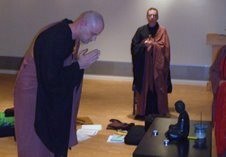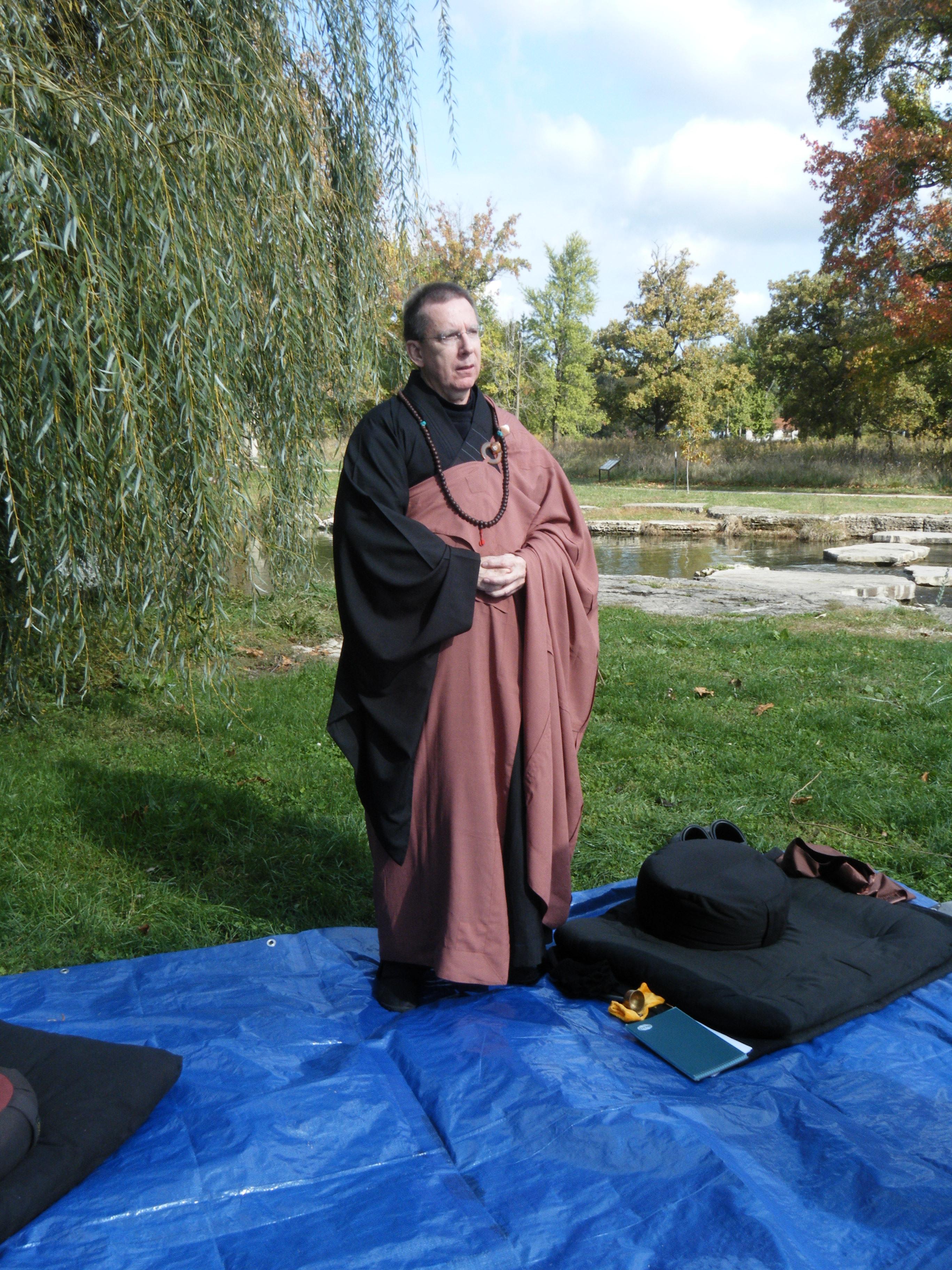By: David Xi-Ken Astor, Sensei
Buddhism is one of the oldest spiritual traditions who’s foundational teaching stresses the importance of experiencing aspects of man’s behavior that promotes human flourishing. Yet, a large portion of Buddhist thought encompasses the philosophical and psychological nature of man and may be lacking in direct and useful language of what “spiritual” means when we strip it of the mystical and metaphysical. It is way to easy to find Buddhist practices that touch on the mystical, or even magical components in the legacy teachings as they have been handed down from the medieval mindset. This is to be expected, but does not make it any easier to find contemporary language that expresses the “spiritual” in agnostic existential terms. There are aspects to Buddhism that many find attractive, especially those that promote harmony in how we live our life among others in engaged activities, and the importance placed on meditation practice. Buddhism also fits nicely in our modern age that promotes the pragmatic and pluralistic view that supports the notion that we never accept anything on the authority of others alone, but on what we can eventually understand from our own verifiable experiences. Without this direct experience our practice is one of blind faith.
This attitude toward reality is inherent in modern thinking. Buddhism does not require anyone to believe anything that they can not rationally understand. Buddhism is not a faith-based religion for those with a serious study practice. Individuals should only hold as reliable what they can confirm through experience. Siddhartha spoke often about the danger of holding opinions with such strong and unyielding force that they could not be subject to change, as this can become another form of attachment. Buddhism is not an otherworldly practice but remains grounded in universal realities. Thus the importance Buddhists places on living in the moment and not expecting the future to be neatly defined, as things never happen the same way twice. All this we know after just a short time in Buddhist study and practice, especially if you are guided by a teacher. Buddhism is very practical and provides a discipline for the body-mind that has the potential to awaken us to how we are, and how the universe is wonderfully mutually interconnected. It does not just say “have compassion for others”, but shows us how living a life aware of our place in our world is a path away from unsatisfactoriness. This is because it is practical and not ideal. A Buddhist practice is found at the intersection where the ideal meets the real.
None of this, however, effectively defines what the “spiritual” component is unless you want to define all Buddhism to be a spiritual practice. One can do this of course, but that does not work for me. Buddhism has three basic dimension: the philosophical, the psychological, and the spiritual. We take this approach as it helps in breaking up the teaching characteristics associated in Buddhist literature. But it is proved difficult when we are left with trying to achieve what could be considered a comprehensive definition of the spiritual. It is both a dilemma and a paradox, especially when most of us can come up with a definition of some sort. When we really try to nail it down, however, we come to realize the complexity of the task.
The term spirituality has had a long and diverse history, especially in the Christian traditions. In many ways, this is a part of the problem as many try to associate the Christian spiritual thought and struggle to bring them into their Buddhist practice. From a Buddhist point of view, spirituality can be defined as the “human quest for personal meaning and mutually understanding of the relationships we have with others, the environment, and the universal.” As Buddhists we avoid language suggesting mention of a god, or concerns associated with the non-mutual causal nature of creation. This leads us away from the Christian notion of the spiritual, but does not act as a clear understanding either. It is just a definition that sounds good. It is also interesting that the core existential phrase “existence before essence” can be used to support either a Christian interpretation of creation (Creator), as can an agnostic or atheist universal view. The challenge is in the interpretation of the word “existence”.
Our spiritual focus is on the immaterial features of life itself, and considered as not commonly perceptible by any of our sense consciousness, but yet perceptible by our mental inner-awareness. In addition, one’s spiritual self awareness has a particular style that becomes prominent from how we seek, use, and expand the spiritual moment from “triggers” outside of our inner-conscious processing. This means that spiritual moments arise when we least expect them, and especially not by self generated thoughts alone. How we process these events is influenced by our personal and cultural development. This brings a degree of complexity into a spiritual practice. We must become aware that the immediate awareness of a spiritual experience that is beyond words to describe, is almost immediately transformed into another form of thought processing when we try to give expression to it. When we begin to intellectualize the experience, we move from the spiritual to the practical. This is normal, but it does transform the special unique moment, while being a life enriching experience, into interpretive meaning. Something is going to be lost in the translation. You might think, “Wow, just what happened?” That question will naturally cause us to begin thinking. When we think, we bring in our dispositions and preferences (filtered thought) in order to catalog what it was we just experienced.
Some may also view spirituality as primarily a relational or transcendent experience which moves them to think about life as sacred. This worldview moves an individual into the realm of mystical uncertainties that has little to do with a Zen practice. Much suffering can arise from such metaphysical enmeshment. Although there is always present the universal-mystery that can not be clearly know. The difference between the mystical and mystery is that the former is defined using language, and the later is just a state of not-knowing. It is the intersection where the Buddha stopped when explaining the principle of Dependent Origination. Any attempt to define spirituality as having a linear-dimension characteristics is in danger of oversimplifying the experience and is misleading. Spiritual moments involves oneself, our interconnectiveness as expressed in our unique universal-expression, and a transcendent element. That transcendent element is the trigger, but a natural trigger nonetheless. It is an experience of connections, were we connect the dots, but without words to express. Spiritual moments arise from the fact we are human with the ability to experience the spirit and wonder of the universe that no words can express. It often seems easier to point to what spirituality is not than to what it is. In that sense, spirituality has something in common with trying to define human emotions of compassion, love, or well being. Spirituality also defies a scientific definition as well.
I may never come to define a clear and concise definition for what I mean by Buddhism having a spiritual dimension. But I do know that spirituality is interrelated with how the body-mind perceives the world around it, which may be a more functional and less vague way of defining the human capacity for experiencing our relationship with all the other universal expressions when the eye sees beyond simple form. There has been more than 2500 years pass since Siddhartha first taught that there is a path away from unsatisfactoriness and toward a harmonious way of experiencing the world in real terms. His teaching is practical, wise, and spiritual too. Today, the spiritual dimension reflected in what he pointed to may be more vital than ever for moving beyond humanity stuck in a world of consumerisms, distrust, and disconnection. A practice, any practice, that promotes the human capacity for seeking the spirit and sharing that experience with others, will bring us closer to confronting some of the harder questions as we begin to explore our universe beyond the confines of this lonely planet.



















































































I think that spirituality is as much about how you live your life, as it is about what you find. The journey, some say, is what it’s all about. I don’t know about the journey part, because to me that seems more like living in the moment. The American Lama Surya Das explains his view on spiritual responsibility. Click on -http://www.huffingtonpost.com/lama-surya-das/spiritual-responsibility-_b_1597886.html